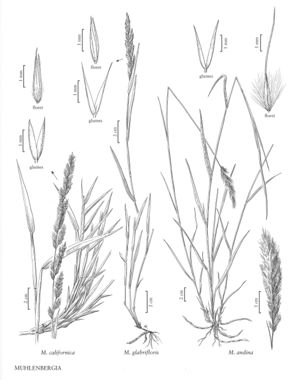Difference between revisions of "Muhlenbergia andina"
FNA>Volume Importer |
FNA>Volume Importer |
||
| Line 17: | Line 17: | ||
-->{{Treatment/Body | -->{{Treatment/Body | ||
|distribution=Colo.;N.Mex.;Tex.;Utah;Calif.;Oreg.;Kans.;Mont.;Wyo.;Wash.;Ariz.;B.C.;Man.;Sask.;Idaho;Nev. | |distribution=Colo.;N.Mex.;Tex.;Utah;Calif.;Oreg.;Kans.;Mont.;Wyo.;Wash.;Ariz.;B.C.;Man.;Sask.;Idaho;Nev. | ||
| − | |discussion=<p | + | |discussion=<p>Muhlenbergia andina grows in damp places such as stream banks, gravel bars, marshes, lake margins, damp meadows, around springs, and in canyons, at elevations of 700-3000 m. It grows only in the western part of southern Canada and the contiguous United States.</p> |
|tables= | |tables= | ||
|references= | |references= | ||
| Line 33: | Line 33: | ||
|basionyms= | |basionyms= | ||
|family=Poaceae | |family=Poaceae | ||
| + | |illustrator=Linda A. Vorobik and Annaliese Miller | ||
|distribution=Colo.;N.Mex.;Tex.;Utah;Calif.;Oreg.;Kans.;Mont.;Wyo.;Wash.;Ariz.;B.C.;Man.;Sask.;Idaho;Nev. | |distribution=Colo.;N.Mex.;Tex.;Utah;Calif.;Oreg.;Kans.;Mont.;Wyo.;Wash.;Ariz.;B.C.;Man.;Sask.;Idaho;Nev. | ||
|reference=None | |reference=None | ||
| Line 38: | Line 39: | ||
|publication year= | |publication year= | ||
|special status= | |special status= | ||
| − | |source xml=https:// | + | |source xml=https://bibilujan@bitbucket.org/aafc-mbb/fna-data-curation.git/src/314eb390f968962f596ae85f506b4b3db8683b1b/coarse_grained_fna_xml/V25/V25_716.xml |
|subfamily=Poaceae subfam. Chloridoideae | |subfamily=Poaceae subfam. Chloridoideae | ||
|tribe=Poaceae tribe Cynodonteae | |tribe=Poaceae tribe Cynodonteae | ||
Revision as of 16:17, 30 October 2019
Plants perennial; rhizomatous, not cespitose. Culms 25-85 cm tall, 0.9-1.7 mm thick, ascending; internodes glabrous for most of their length, scabrous to strigose below the nodes. Sheaths scabridulous, especially basally; ligules 0.5-1.5 mm, membranous, truncate, lacerate to ciliate; blades 4-16 cm long, 2-4(5) mm wide, flat, scabrous abaxially, pubescent adaxially. Panicles 2-15 cm long, 0.5-2.8 cm wide, contracted, dense; primary branches 0.5-5 cm, appressed to strongly ascending; pedicels 0.5-1.5 mm, appressed, strigose. Spikelets 2-4 mm. Glumes equal to subequal, 2-4 mm, subequal to or longer than the florets, 1-veined, veins scabridulous, apices acuminate to awn-tipped; lemmas 2-3.5 mm, lanceolate, grayish-green, hairy on the calluses and lemma bases, hairs 2-3.5 mm, apices acuminate, awned, awns 1-10 mm; paleas 2-3.5 mm, lanceolate, bases with silky hairs between the veins, apices acuminate; anthers 0.4-1.5 mm, yellow. Caryopses 0.9-1.1 mm, cylindrical, yellowish-brown. 2n = 20.
Distribution
Colo., N.Mex., Tex., Utah, Calif., Oreg., Kans., Mont., Wyo., Wash., Ariz., B.C., Man., Sask., Idaho, Nev.
Discussion
Muhlenbergia andina grows in damp places such as stream banks, gravel bars, marshes, lake margins, damp meadows, around springs, and in canyons, at elevations of 700-3000 m. It grows only in the western part of southern Canada and the contiguous United States.
Selected References
None.
